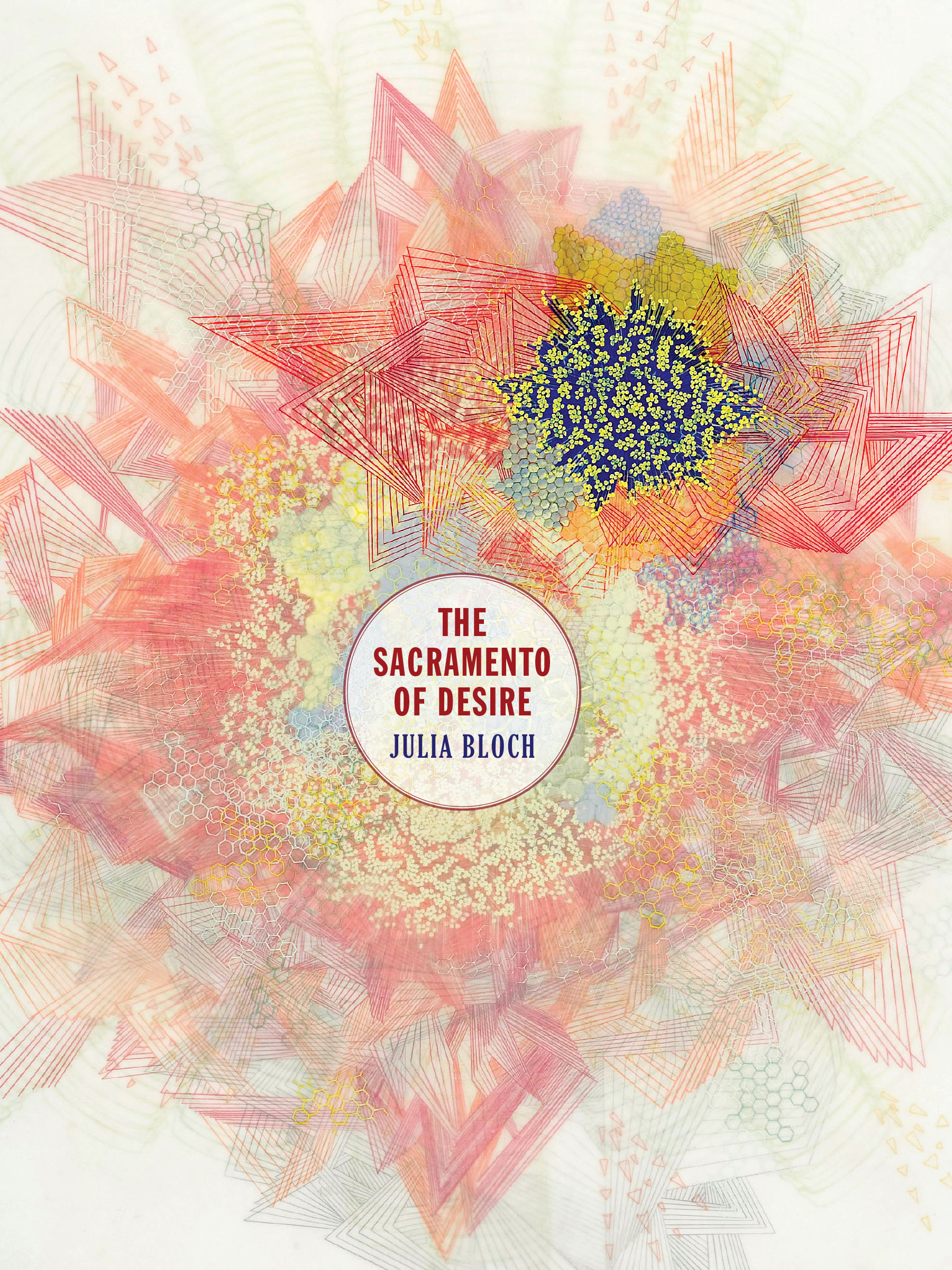: : : sidebrow : : :
SACRAMENTO OF DESIRE
by Julia Bloch

February 2020
93 pages
978-1-940090-12-2
“the contract of reading Behind the graveyard in Hollywood Forever, two animals murmur. The remains of that fire and then a wet pivot. You only get a future child. Who said anything about an animal? Who said anything about a pivot? There is no beast in a forest, just four streaks of light beyond that palm and the body incubates curved space, laps at its own cortisol, testosterone, gonadotropin, a hole to hold someone clean as smoke an egg is a genre”
This third installment in Bloch’s California trilogy picks up right where Letters to Kelly Clarkson and Valley Fever left off — that is to say, at “Ovulept: the mediation, disruption, and restructuring of ovulatory time by anthropogenic factors, including lungfull emissions, endocrine disruptors, hazy particulates.”
“Julia Bloch’s horologic epic proceeds by chopped narrative, gorgeous musics, casual talk tatters, quote startles, and deep wash-overs, all infected with loss. It’s a quest built from the logics of encountering a monstrous fertility-industrial complex. The work stirs and sifts this “uncompostable grief,” and yet fellow poets, friends, and interlocutors shine behind every line. This book brims with community, crowded and leavened by voices.” —Allison Cobb
“In this sacra-momentous work by Julia Bloch, the moment of a biochemically mediated human is jarred into recognition. It’s a new, feminist, queer machinery that pervades, interrupts, and incurs high charges over a necessary tenderness, ‘completely waiting for technology to get right down to the center of experience.’ Throughout Bloch’s examinations of the multiplicity of boundaries — from the cell walls of the ovum to the architectural, emotional, affective limits put up by society — a quiet insidious toxicity infiltrating the multiple Californian landscapes of this book invades the syntax of a richly swerving language that considers the corporeal desires behind the mechanics and borders of humans as data, as sentences, as reproductive machines, as incubated negotiations of desire — ‘So go not on your nerve but on your last disaster’ — an urgent call!” —Sawako Nakayasu
Previous Praise for Julia Bloch’s Letters to Kelly Clarkson and Valley Fever
“For all their complexity of diction, there’s a touching simplicity to Bloch’s poems. By taking Kelly seriously, on her own terms, Bloch moves beyond the safety of ‘camp’ into a realm of genuine tragedy and love. It’s a stunning collection.” —Dodie Bellamy
“The letters posit Clarkson as container in which a multitude of cultural neuroses about femininity, desire, and the characteristics of reality fit, leaving readers feeling anxious about their own complicity in a system which venerates Clarkson’s emptiness.” —Sarah Burghauser, Lambda Literary
“Bloch is an amazing young writer who could do just about anything, but she decided to write a cockeyed masterpiece instead.” —Kevin Killian
“In this book, ‘the battle isn’t outside’; rather, it is about the internal lives of women — and one woman in particular — struggling with the confines of ‘femininity’s dystopic embrace.’ ” —Chris McCreary, The Volta
“Bloch’s poems borrows text from a variety of sources — Wordsworth’s Prelude, Stoker’s Dracula, Slovenian philosopher Slavoj Žižek’s paper on The Matrix. This expands the scope of the book beyond the obvious questions of celebrity, and puts it in conversation with other works of poetry, fiction, politics, and philosophy. It is a testament to craft that Bloch weaves these multiple conversations seamlessly into a singular, intimate conversation with the first American Idol.” —Rachel Mangini, Bookslut
“And like other collections that follow a similar form (e.g. Spicer’s After Lorca or Wenderoth’s Letters to Wendy’s), direct address to a cultural figure or entity infuses the book with a certain amount of levity. But the humor inherent in this imagined correspondence does not negate the more serious theoretical concerns of the book.” —Joshua Ware
“The blips divulged in Letters to Kelly Clarkson by Julia Bloch could almost make a reader blush with how personal and, at times, crushingly earnest they are.” —Charlotte Seley, Rediver
“Valley Fever manages to infuse its language with political urgency in a manner that maintains subtlety and and avoids preaching. This is important poetry that both entertains and resonates with contemporary culture.” —Becky Peterson, The Rumpus
“In the procedure of Valley Fever, Bloch destablizes the center of many poems, a formal choice that enhances the tension between context and concepts.” —Heather Bowlan, make/shift
Julia Bloch grew up in Northern California and Sydney, Australia. She earned a BA in political philosophy from Carleton College, an MFA in creative writing from Mills College, and a PhD in English from the University of Pennsylvania. She is the author of Letters to Kelly Clarkson, a finalist for the Lambda Literary Award, and Valley Fever. She is the recipient of the Joseph Henry Jackson Literary Award from the San Francisco Foundation, a Pew Fellowship in the Arts, and other honors. She directs the Creative Writing Program at the University of Pennsylvania and is an editor at Jacket2. She lives in Philadelphia.